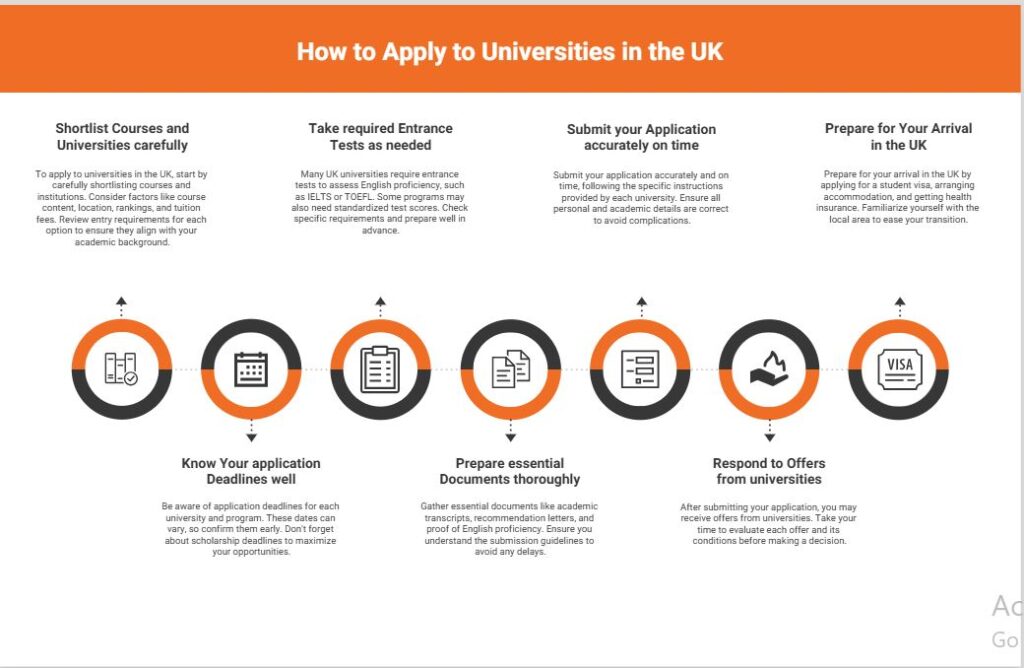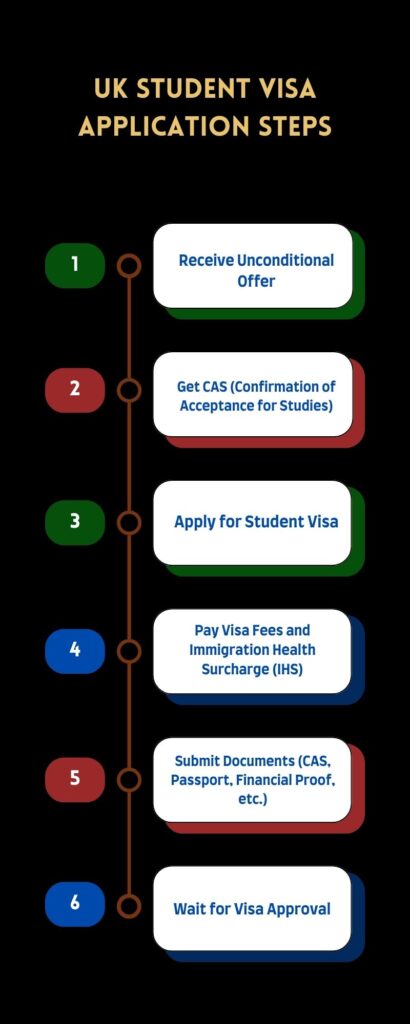If you are planning to study in the UK in the future, you will find the information helpful. Here, you will find UK admission guide for covering everything from admission timelines to CAS interviews, documents, IELTS exams, fees, and visa procedures. Additionally, we have covered fully funded scholarships for international students in the UK.
We recommend you start your preparation almost a year before your admission if you are not getting help from any agency or individual. It takes time to understand the process, institutions, courses, costs of studying and living, visa procedure and everything else.
Guys! Read this blog and prepare yourself accordingly. This UK admission guide for international students covers everything you need to know about studying in the UK.
UK admission guide for international students
The United Kingdom has some of the world’s top universities. These universities offer recognized degrees, different cultures, and great career opportunities. Every year, thousands of students from around the world choose the UK for their undergraduate and postgraduate studies.
However, going to the UK for studies can be challenging if you don’t have the right information or don’t know where to find it. The process can be simple if you have the right information and understand the application process clearly.
Coming to study in the UK is your opportunity to gain the skills, outlook, and confidence you need to fulfill your potential.
So, let’s begin with the timeline. It’s important to know when admissions start and what key dates to remember so you don’t miss any deadlines. The most crucial thing is to understand when the admissions open and when to submit your application.
Admission Timelines
There are three main intakes in the UK for undergraduate, postgraduate, and diploma programs:
- September/October intake (Fall intake)
- January/February intake (Winter intake)
- April/May intake (Summer intake)
Therefore, plan your admission based on these timelines.
Now let’s look at few universities for timeline:
Undergraduate Courses (via UCAS):
- Mid-May: UCAS applications open for the following academic year.
- 15 October: Deadline for Oxford, Cambridge, and most medicine, dentistry, and veterinary science courses.
- 29 January: Main UCAS deadline for equal consideration.
- 30 June: Applications submitted after this date enter Clearing.
Postgraduate Courses:
- No fixed deadline — each university sets its own. It’s advisable to apply 6–12 months in advance.
Ideal Start: September/October intake is the most popular. Some universities also offer January and April intakes for select courses.
General Tip: Apply early as courses may fill up before official deadlines.
How to Apply to UK Universities? Step by Step guide

Once you know the timeline, the next process is to start your research about universities, courses, admission requirements, application fees, and other important stuff. To make it easier for you we have gone through the process.
Decide on a university or college and course
Research UK universities and compare available courses, locations, and entry requirements. Use tools like the UCAS course search or visit university websites. Contact universities directly if you have questions — they’re happy to help.
It can be overwhelming in the beginning but as you go through a few universities official pages, you will get used to it. It will make the navigation easier for you once you are familiar with the webpage.
Register and Apply
Undergraduate: Apply through UCAS, which is one centralized platform for all UK undergraduate programs.Postgraduate: Application processes and entry requirements vary by course and university. Check the official website of each program for specific guidance.
Several universities do not require an application fee. Therefore, registering and applying for the courses will take a few minutes of your time. Also, you will be able to navigate and understand the whole process.
For most universities, you register with them, create your account, and enter all details on your profile to apply for a program. The information includes your details, educational details, and professional work experience. Few universities only require you to fill out an application form.
Accept Your Offer
Once you apply, the university will contact you via email or UCAS: You will receive two kinds of acceptance. One is free from any requirement while the other is to meet some conditions.
Unconditional Offer: You’re in! Accept your offer and proceed.
Conditional Offer: You need to meet certain conditions, such as exam results or language test scores. Usually, it’s IELTs exams, or any other exam required by the university.
Some courses may require an interview — check program details beforehand.
Arrange Funding for UK admission
Secure funding early. Explore scholarships and financial aid opportunities provided by universities, the British Council, or your home government. Look into Chevening, Commonwealth, STEM, and university scholarships listed above.
Apply for a Visa
After accepting your offer and receiving your CAS letter, apply for a UK student visa (Student Route). More details below. If you are not familiar with CAS, we are going to explain in a bit.
Prepare for Your Stay
If you are on self-Finance, book flights, sort accommodation, and pack essentials. Join pre-departure briefings or orientation webinars hosted by universities or education bodies. However, if you are receiving any fundings, you do not have to worry about the financial part of it, and also you will get guidance on every stage of the process.
Required Documents

International students must prepare the following documents:
- Academic Transcripts & Certificates (attested)
- Proof of English Language Proficiency (IELTS, TOEFL, PTE, etc.)
- Personal Statement (SOP)
- Letters of Recommendation (2 for most PG courses)
- Valid Passport
- Updated Curriculum Vitae (CV) for postgraduates
- Research Proposal (for research-based programs)
- Portfolio (for creative courses, such as Art & Design)
Make sure your documents are in English or translated by a certified translator. Universities may also ask for a passport-sized photograph and a copy of your national ID.
Application Fees
UCAS (Undergraduate): £28.50 for up to 5 courses.
Postgraduate: Varies by university.
Examples:
University of Cambridge: £50
Glasgow University: £25
University of Oxford: £75
🔹 Universities without Application Fees: Some universities waive application fees for specific applicants or offer free applications during scholarship rounds. UK public universities do not charge any application fee. Few of them includes:
- University of Southampton (some courses)
- University of Exeter (during fee waiver campaigns)
- University of Dundee
- University of Nottingham (selected PG programs)
- University of Bristol
- University of Stirling
- University of Durham
- University of Glasgow
Always check the official website or email admissions for up-to-date fee policies.
Course Duration
- Master’s Degrees: Most UK master’s programs are 1 year (full-time), making them cost-effective.
- Undergraduate Degrees: Typically 3 years (4 in Scotland).
- Integrated Master’s: 4 years combining UG + PG study.
- PhDs: Usually take 3–4 years.
CAS Interview & Pre-CAS Process
Some universities conduct an interview known as CAS interview as part of the admission process. The CAS (Confirmation of Acceptance for Studies) and Pre-CAS interview are related but distinct parts of the UK student visa process.
The CAS is a unique reference number provided by the university once you meet all admission requirements. It confirms your unconditional acceptance to a course and is necessary to apply for a UK student visa.
On the other hand, the Pre-CAS interview is conducted by some universities before issuing the CAS. This interview, typically lasting 30–40 minutes, is designed to assess your genuine student intent, English language proficiency, understanding of your course and university, and financial preparedness.
If you do not perform well in the Pre-CAS interview, the university may decide not to issue the CAS, which would prevent you from applying for the student visa. In summary, the Pre-CAS interview happens before you receive the CAS, and the CAS is the official document you need for your visa application.
Why you chose the UK and the university
- Knowledge about your course
- Future goals and career plans
- Proof of funds and living expenses
Note: Not all students are interviewed, but be prepared. Failing the interview may delay or cancel your CAS.
UK Student Visa (Student Route / Tier 4)
Most international students need a visa to study in the UK. If you are 16 or over and your course is longer than six months, you’ll need to apply for a Student Visa under the Student Route.
Step-by-Step Guide to Apply
Receive Unconditional Offer: Apply and receive an unconditional offer from a UK university.
Get CAS (Confirmation of Acceptance for Studies): After accepting your offer, your university will issue a CAS.This costs around £25. Remember, not every university in the UK charges for issuing a CAS (Confirmation of Acceptance for Studies).
However, some universities may require a fee to issue the CAS, particularly if the university provides additional services or has specific policies related to international students.
Typically, the CAS fee (if applicable) is included in your tuition fees or may be a separate charge, and this varies by institution.
Start Application Process: Apply for your student visa up to 6 months before your course begins.
Pay Visa Application Fee: £490 (standard processing). Priority or super-priority services cost more.
Pay Immigration Health Surcharge (IHS): £776 per year. £388 for stays of 1-6 months.
Submit Documents: Include CAS, passport, English test scores, financial proof, TB test (if applicable), and ATAS certificate (for certain science courses).
Prove English Language Skills: Check with your university what test scores they require.
Visa Approval: Complete your application and receive your visa before arriving in the UK.
Note: From January 2025, students must register with UK Visas and Immigration (UKVI) and apply for an eVisa. Check the UKVI FAQs for more.
Additional Visa Types
- Visitor Visa: For short courses (<6 months). £115 for standard visitor visa.
- Short-term Student Visa: For English language courses between 6–11 months.
- Child Student Visa: For students aged 4–17 studying at UK schools.
Post-Study Opportunities
Graduate Route Visa: Stay in the UK for up to 2 years (3 years for PhD graduates) after your studies to look for work.
Work During Study: Student visa holders can work up to 20 hours per week during term time and full-time during vacations.
Dependants: From 2024 onwards, dependents are only allowed for postgraduate research students.
UK scholarships for international students
International students can find fully funded scholarships, partially funded scholarships, tuition fee waiver, living expense covered programs, and other forms of funding to study in the UK. Few of the most popular programs to study in the UK includes:
UK Government Scholarships
- Chevening Scholarship: Funded by the UK government, these scholarships are awarded to outstanding scholars worldwide for a one-year master’s degree. They typically cover tuition fees, a living allowance, return airfare, and additional grants.
- Commonwealth Scholarship Program :The Commonwealth program is one of the biggest programs that offers fully funded scholarships to students from around the world to study in the UK. There are almost 7 Commonwealth programs for masters, PhD and even online degree programs. These scholarships are either through partner organizations or you can directly apply.
- Scotland Saltire Scholarships
Offered by the Scottish Government in collaboration with Scottish universities, these scholarships are available to citizens from Canada, China, India, Japan, Pakistan, and the USA. They provide £8,000 towards tuition fees for one-year full-time master’s degrees in specific fields. - GREAT Scholarships
These scholarships offer students from selected countries £10,000 towards tuition fees for a wide range of one-year taught postgraduate courses in the UK. - British Council STEM scholarship
The British Council’s Women in STEM Scholarships aim to support women from eligible countries pursuing one-year master’s degrees in Science, Technology, Engineering, and Mathematics (STEM) fields at UK universities. These scholarships cover full tuition fees, a monthly stipend for living expenses (including accommodation), return economy-class travel, visa and health coverage fees, and the IELTS exam fee if applicable.
Applicants must be passport holders and permanent residents of participating countries, have completed an undergraduate degree that meets UK university entry requirements, demonstrate financial need, and show active engagement or interest in STEM fields.
UK University Scholarships
- Gates Cambridge Scholarships
Awarded to outstanding applicants from any country outside the UK to pursue a full-time postgraduate degree at the University of Cambridge. The scholarship covers the full cost of studying and provides additional discretionary funding. - Clarendon Scholarships at University of Oxford
This prestigious graduate scholarship scheme offers around 140 new scholarships annually to eligible graduate applicants at the University of Oxford. The scholarships cover tuition and college fees in full, along with a generous grant for living expenses. - University of Sussex Chancellor’s International Scholarships
Available in the majority of Sussex Schools, these scholarships are awarded based on academic performance and potential to non-EU international students for eligible full-time postgraduate taught degrees. The scholarship offers a 50% reduction in international student tuition fees for one year. - Bristol University Think Big Scholarships
Bristol University offers scholarships ranging from £6,500 to £26,000 for international students applying for undergraduate and postgraduate courses. - Warwick Undergraduate Global Excellence Scholarships
These scholarships are for gifted, ambitious international students to pursue their academic interests at the University of Warwick. About 20 full-fee scholarships, 160 half-fee scholarships, and 70 awards of £2,000 are being offered. - Rhodes Scholarships at University of Oxford
The Rhodes Scholarship is a prestigious award that enables talented international students to study at the University of Oxford. It covers all university and college fees, a living stipend, and other allowances. - Marshall Scholarships
These scholarships finance young Americans of high ability to study for a graduate degree in the United Kingdom. Up to 50 scholars are selected each year to study at the graduate level at a UK institution in any field of study.
Besides these scholarships, you can find other funding opportunities visiting university webpages and check under ‘’funding ‘’.
Useful Tips for UK admission
- Start preparing at least 12 months in advance.
- Shortlist universities based on courses, scholarships, and career prospects.
- Create a checklist of deadlines and required documents.
- Keep digital and physical copies of all documents.
- Stay updated with UKVI (UK Visas & Immigration) guidelines.
- Prepare for Pre-CAS interviews like a mini visa interview.
- Join webinars and university Q&A sessions.
| Component | Details |
| Undergrad Deadline | 15 Oct (Oxbridge), 29 Jan (Others) |
| Postgrad Deadline | Varies (Usually Nov–May) |
| Application Fee | £28.50 (UG), £25–£75 (PG) |
| Master’s Duration | 1 Year (Full-time) |
| CAS | Needed for Visa Application (£25) |
| Visa Fee | £490 + IHS (~£776/year) |
| Interview | Required for CAS (Pre-CAS Interview) |
| Financial Proof | £1,023–£1,334/month for up to 9 months |
The UK offers a rich academic and cultural experience. With a well-planned approach, strong documents, an understanding of visa requirements, and the right fully funded scholarship, you can make your UK study dream a reality in 2025.
Have questions? Drop them in the comments or explore more resources on our blog.



